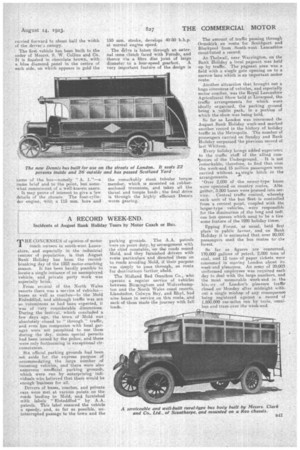A RECORD WEEK-END.
Page 25

If you've noticed an error in this article please click here to report it so we can fix it.
Incidents of August Bank Holiday Tours by Motor Coach or Bus.
THE•CONCENSUS of epinion of motor I coach owners in south-west Lancashire, and especially in the industrial centres of population, is that August' Bank Holiday has been the recordbreaking day of the 1923 motor-coaching
season. It has been hardly possible to. locate a single instance of an unemployed vehicle, and private party work was especially brisk. ,
From several of the North Wales resorts there_ was a service of vehicles— buses as well as coaches—to the Mold Eisteddfod, and although traffic was not so voluminous as had been expected, it was of very considerable dimensions. During the festival; -which concluded a few days ago, the town of Mold was _ absolutely • closed to " through " traffic, arid even bps companies with local gar. ages were not permitted . to use them during the day, unless special permits had been issued by the police, and-these were only forthcoming in exceptional circumstances.
Six official parking grounds had been set aside for the express purpose 'of accommodating the large number of incoming vehicles, and there were also numerous unofficial parking grounds, which Were run by enterprising individuals who believed that there would be enough business for all. e
Drivers of buses, coaches, and private cars were met at various points on the roads leading to Mold, and furnished with labels "Eisteddfod" by A.A. patrols. This label ensured the vehicle a speedy, and, so far as possible, uninterrupted passage to the town and the • parking grounds. The A.A. patrols were on point duty, by arrangement with the chief constable, on the reads round Mold, arid they furnished drivers with route particulars and directed them on to roads avoiding. Mold, if their purpose was simply to pass through, en route for destinations farther_ afield.
The Midland Red Omnibus Co. who operate a regular service of vehicles between Birmingham and Wolverhampton and the North Wales coast 'resorts, Llandudno, Colwyn Bay, and Rhyl, had nine. buses in service on this route, and each of them made the journey with full loads.
The amount of traffic passing through Ormskirk en route for Southport and Blackpool from .South-west Lancashire constituted a record.
At Thelwall, near Warrington, on the Bank Holiday a local pageant was held up by traffic. The pageant area. was a field with a single gate opening on to a narrow lane which is an important motor route. • Another attraction that brought out a
huge concourse of vehicles and especially motor coaches, was the Royal Lancashire
Agricultural Show held at. Liverpool, the traffie arrangements for which -were ideally organized, the parking ground being a public park, in a portion of which the show was being held.
So far as London was concerned the August. Bank Holiday week-end marked another record in the history of holiday . traffic in the Metropolis. The number of passengers carried on Sunday and Bank Holiday surpassed the previous record ol last Whitsun.
Every holiday brings added experience to the traffic staff of the allied Corn spernies of the Underground. It is not remarkable, therefore, to find that over the week-end 15 million passengers were carried without aesingle hitch in the arrangements. •" 'Over 2,000 of the newer-type buses were operated on country routes. Alto gether, 3,800 buses were peassed into ser vice. Central traffic control, whereby each unit of the bus fleet' is controlled 'from a central point., coupled with the larger-type vehicles, were responsible 'for the diminution of the long and tedious bus queues which used to be a tiresome feature of the 1920 holiday times: Epping Forest, as usual,' held firsl place in public favour, and on Bank Holiday it is estimated that over 80,00C passengers used the bus routes to the forest. • So far as figures are concerned, 170,000 gallons of petrol., 2,000 tons of coal, and 12 tons-of paper tickets were consumed in moving London about its week-end pleasures. An army of 20,000 uniformed employees was required each day to deal with the large numbers, and the most memorable week-end in the hise,ry of London's pleasure traffic closed onMonday after midnight without' a single mishap of any consequence being registered against a. record Of 1,850,000 car-miles run by train, omnibus and tram over the week-end.




























